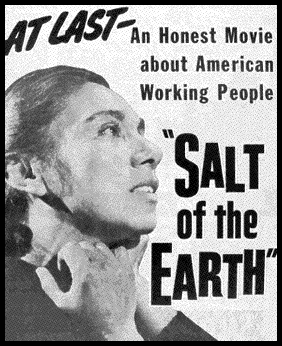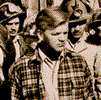Legendary labor organizer Clinton Jencks, who led mineworkers in New Mexico in a strike depicted in the classic movie Salt of the Earth, died Dec. 15 in San Diego of natural causes. He was 87.
An international representative of the Amalgamated Bayard District Union of Mine, Mill, and Smelter Workers in New Mexico, Jencks was convicted of falsely swearing a non-Communist affidavit required of officials under the Taft-Hartley Act during the McCarthy era. His five-year prison sentence was reversed by the Supreme Court in the landmark 1957 decision, Jencks v. United States. The government had refused to turn over to the defense statements made by prosecution witnesses, including Harvey Matusow, a former Communist who went to work for Senator Joseph McCarthy. Matusow later recanted his testimony against Jencks in the book False Witness.
The Supreme Court ordered the government to give Jencks full access to its records. After the FBI refused, the prosecution was forced to dismiss the case against Jencks. Thanks to the Jencks case, the government is now required to provide the defense with prosecution witness statements. This hurdle was cited by the Department of Justice as a reason for abandoning prosecutions under the Smith Act, the centerpiece of federal anti-Communist legislation in the 1940s and 1950s.
Three months after the Jencks case was decided, Congress enacted the Jencks Act in order to blunt the effects of the high court’s decision. The statute provides that no statement of a government witness shall be turned over to the defense until after the witness has first testified on direct examination.
Jencks raised the ire of the government with his successful organizing efforts. He was beaten up, thrown into jail, and his car was shot full of holes. “Why was I singled out?” Jencks asked. “I was a very good organizer. I was dangerous in that sense.” Jencks said his work “concentrated at an intersection of several important struggles” — the proliferation of union organization after the Great Depression and World War II, and the new struggles of Mexican-American workers and of women.
Unusually democratic in his sensibility to all people, Jencks respected everyone, cultivating leadership within the rank and file. Dolores Huerta, co-founder of the United Farm Workers, said, “His life was one of extraordinary bravery. He was a pioneer, such a leader in an organization of mostly Spanish-speaking people. He earned everyone’s respect.”
Jencks, whom the Latino workers affectionately dubbed “El Palomino,” said, “If you believe in freedom, it’s freedom for everybody. And the only way you can test another’s devotion to freedom is in the crucible of struggle.”
Jencks led the primarily Latino union in a 15-month strike against Empire Zinc Co. beginning in 1950. They demanded equal pay with white workers, better safety conditions, and healthcare. When the men were enjoined from walking the picket line, the women took over, and the men tended house, a radical notion in the 1950s. The strike was ultimately successful.
 |
Salt of the Earth chronicled that strike. Made by blacklisted filmmakers, it was produced on a shoestring with few professional actors. The strikers, including Jencks, portrayed themselves in the film. Theaters nationwide succumbed to pressure from the House Committee on Un-American Activities (HUAC), the Screen Actors Guild, and the International Alliance of Theater and Stage Employees, and refused to show the film.
One of only 100 films selected by the Library of Congress for the National Film Registry, Salt of the Earth is one of the most widely viewed films in the world.
Lorenzo Torres was a fellow striker; his wife, Anita, walked the picket line. The couple, who also worked with Jencks on the film, said, “Clinton’s contribution has not been matched since then. The coalition work which resulted from his leadership was a phenomenal improvement from the past and still is present. It will resonate among the miners.”
Jencks, a highly decorated war veteran, was blacklisted and unable to find work for many years. He moved to San Francisco, a union town, and finally got a job. But, he said, “The FBI is very powerful and far-reaching.” Once again, he was out of work, leading a California State Employment counselor to tell him, “We need a new unemployment classification for you. I think you may be politically unemployable.”
In 1959, Jencks was awarded the prestigious Woodrow Wilson Fellowship for training university professors. He was then ordered to appear before HUAC. In spite of intense pressure from the FBI, the foundation affirmed his fellowship and Jencks received a Ph.D. in economics from UC Berkeley and later taught for 22 years at San Diego State University. When Jencks began teaching, the university withstood intense pressure to fire him; it had succumbed to red baiting of prior faculty members and was determined to stand firm behind Jencks.
Frank Wilkinson was another target of the government’s red-baiting during this period. In the heyday of McCarthyism, Wilkinson formed The National Committee to Abolish HUAC which ultimately succeeded in its goal. Wilkinson, who went to jail for a year for refusing to testify before HUAC, said of Jencks: “Clint’s heartfelt contributions to building a better world are forever enshrined in the history of people fighting for peace and justice.”
Clinton Jencks remained committed to the fight for economic and social justice. Three days before he died, Clint told me he saw parallels between the repression he and others endured during the McCarthy period and the Bush administration’s current policies. A true egalitarian, Clint said, “We can have individual dignity only if all have dignity. Life is a choice, and we have to choose to make a difference — a better life for everyone without exception.”
Jencks is survived by his wife, Muriel, four stepdaughters, four grandchildren, and one great grandson. His son, Clinton, died in 1995. Donations can be sent to the Peace Resource Center, 3850 Westgate Place, San Diego, CA 92105; San Diego Hospice and Palliative Care, 4311 Third Avenue, San Diego, CA 92103; and Southern California Library for Social Studies and Research, 6120 South Vermont Avenue, Los Angeles, CA 90044.
Marjorie Cohn, a professor at Thomas Jefferson School of Law, is president-elect of the National Lawyers Guild, and the US representative to the executive committee of the American Association of Jurists.

